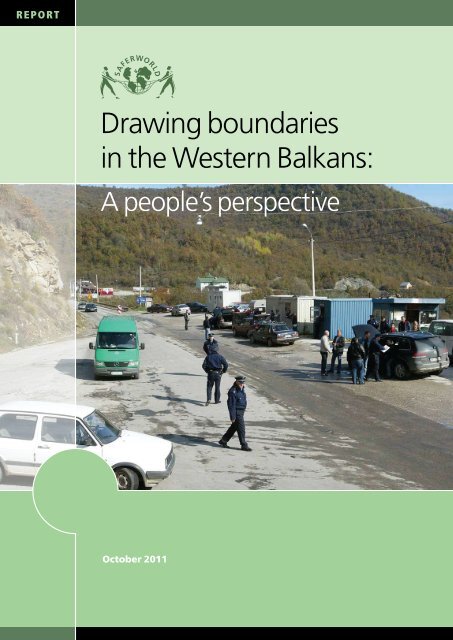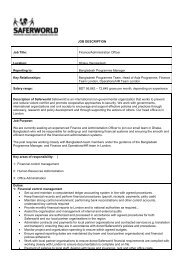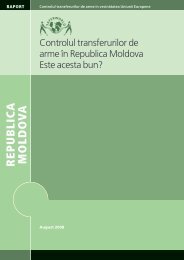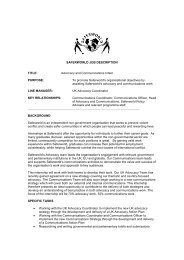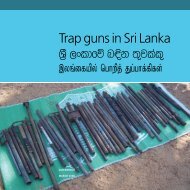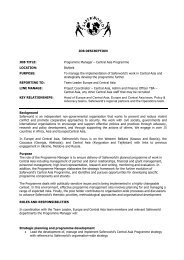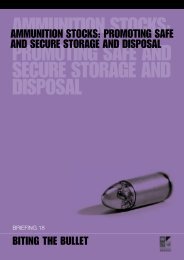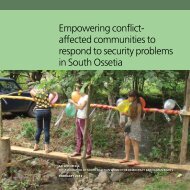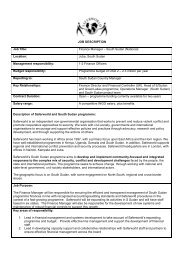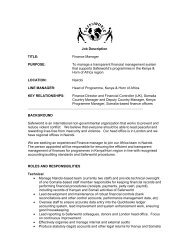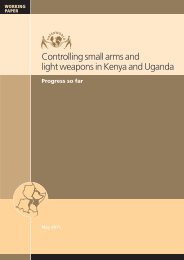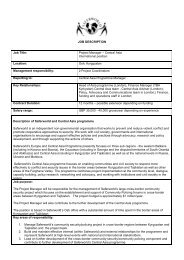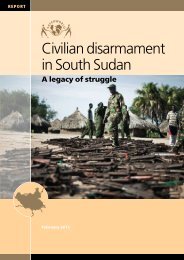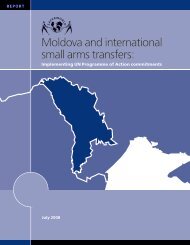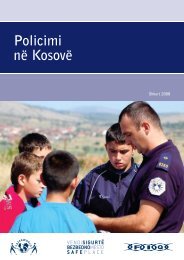Download: Drawing Boundaries in the Western Balkans - Saferworld
Download: Drawing Boundaries in the Western Balkans - Saferworld
Download: Drawing Boundaries in the Western Balkans - Saferworld
You also want an ePaper? Increase the reach of your titles
YUMPU automatically turns print PDFs into web optimized ePapers that Google loves.
eport<br />
<strong>Draw<strong>in</strong>g</strong> boundaries<br />
<strong>in</strong> <strong>the</strong> <strong>Western</strong> <strong>Balkans</strong>:<br />
A people’s perspective<br />
October 2011
Contents<br />
Key f<strong>in</strong>d<strong>in</strong>gs across <strong>the</strong> region 1<br />
Research approach 5<br />
Case study profile: The border at Kulla/Kula between Peja/Peć, Kosovo and 6<br />
Rožaje/Rozhaja, Montenegro<br />
Case study profile: The border/boundary area between Karaçeva/Karačevo, 8<br />
Kosovo and Bujanovac, Serbia<br />
Case study profile: The border area between Bijelo Polje, Montenegro and 10<br />
Prijepolje, Serbia<br />
Case study profile: The islets of Mali and Veliki Skolj between Neum, Bosnia 12<br />
and Herzegov<strong>in</strong>a and Slivno, Croatia<br />
A people’s approach to resolv<strong>in</strong>g border disputes <strong>in</strong> <strong>the</strong> <strong>Western</strong> <strong>Balkans</strong> 13<br />
SLOVENIA<br />
Bijelo Polje, Montenegro<br />
and Prijepolje, Serbia<br />
Zagreb<br />
CROATIA<br />
HUNGARY<br />
Border/boundary area between<br />
Karaçeva/Karačevo, Kosovo<br />
and Bujanovac, Serbia<br />
ROMANIA<br />
Belgrade<br />
BOSNIA AND<br />
HERZEGOVINA<br />
SERBIA<br />
Sarajevo<br />
Mali and Veliki Skolj<br />
MONTENEGRO<br />
Prist<strong>in</strong>a<br />
Podgorica<br />
KOSOVO<br />
Skopje<br />
BULGARIA<br />
ITALY<br />
ADRIATIC SEA<br />
THE FORMER YUGOSLAV<br />
REPUBLIC OF MACEDONIA<br />
Kulla/Kula and<br />
Rožaje/Rozhaja<br />
ALBANIA<br />
GREECE<br />
Viti/Vit<strong>in</strong>a and<br />
Çuçer-Sandevë<br />
This map is <strong>in</strong>tended for illustrative purposes only. <strong>Saferworld</strong> takes no position on whe<strong>the</strong>r this representation is legally<br />
or politically valid.
1<br />
<strong>Draw<strong>in</strong>g</strong> boundaries<br />
<strong>in</strong> <strong>the</strong> <strong>Western</strong> <strong>Balkans</strong>:<br />
A people’s perspective<br />
Key f<strong>in</strong>d<strong>in</strong>gs across <strong>the</strong> region<br />
This report exam<strong>in</strong>es five contested borders/boundaries <strong>in</strong> <strong>the</strong> <strong>Western</strong> <strong>Balkans</strong>, tak<strong>in</strong>g<br />
a people’s perspective by focus<strong>in</strong>g on <strong>the</strong> views of and impact on people liv<strong>in</strong>g near <strong>the</strong><br />
borders and o<strong>the</strong>r stakeholders. The five cases are:<br />
1. The border demarcation process between Kosovo and Montenegro over Kulla/Kula,<br />
<strong>in</strong> <strong>the</strong> area of Peja/Peć, Kosovo and Rožaje/Rozhaja, Montenegro<br />
2 Tensions surround<strong>in</strong>g <strong>the</strong> border/boundary between Karaçeva/Karačevo, Kosovo<br />
and Bujanovac, Serbia<br />
3. The <strong>in</strong>complete process of border demarcation between Bijelo Polje, Montenegro<br />
and Prijepolje, Serbia<br />
4. The unresolved border demarcation question over <strong>the</strong> islets of Mali and Veliki Skolj<br />
between Bosnia and Herzegov<strong>in</strong>a (BiH) and Croatia<br />
5. The resolved border demarcation process between Kosovo and <strong>the</strong> Former Yugoslav<br />
Republic of Macedonia (FYROM), between Debellde, <strong>in</strong> <strong>the</strong> Kosovan municipality of<br />
Viti/Vit<strong>in</strong>a, and <strong>the</strong> neighbour<strong>in</strong>g municipality of Çuçer-Sandevë, FYROM<br />
The process of establish<strong>in</strong>g borders between different republics and prov<strong>in</strong>ces of <strong>the</strong><br />
former Yugoslavia has brought diverse challenges. While each case study has its own<br />
<strong>in</strong>dividual nuances, with stakeholders and affected or <strong>in</strong>volved members of <strong>the</strong> public<br />
hold<strong>in</strong>g different perspectives, this report provides an overview of <strong>the</strong> issues and<br />
lessons that have been identified.<br />
A range of political dynamics underlies <strong>the</strong> slow progress <strong>in</strong> resolv<strong>in</strong>g <strong>the</strong>se outstand<strong>in</strong>g<br />
border cases. The Kosovo-Serbia border/boundary problems emanate from<br />
deadlock over Kosovo’s <strong>in</strong>dependence. Whenever <strong>the</strong>re is discussion of fur<strong>the</strong>r<br />
border/boundary changes to reflect <strong>the</strong> ethnic demography of border areas, <strong>the</strong> local<br />
tensions this creates reverberate around <strong>the</strong> wider region, where people of common<br />
ethnicity straddle borders/boundaries <strong>in</strong> a number of places. For <strong>in</strong>stance, uncerta<strong>in</strong>ty<br />
and tension regard<strong>in</strong>g Kosovo were said to be l<strong>in</strong>ked to progress <strong>in</strong> demarcat<strong>in</strong>g <strong>the</strong><br />
border between Montenegro and Serbia, which was perceived to have slowed s<strong>in</strong>ce<br />
2009, when Montenegro recognised Kosovo as an <strong>in</strong>dependent state.
2 d r a w i n g b o u n d a r i e s <strong>in</strong> t h e w e s t e r n b a l k a n s : a p e o p l e’s p e r s p e c t i v e<br />
A public event <strong>in</strong> Kosovo.<br />
s a f e r w o r l d<br />
➜<br />
In o<strong>the</strong>r cases security and even environmental factors were found to have held up<br />
progress. If a disputed area has ever conta<strong>in</strong>ed military bases, its perceived strategic<br />
value can be a factor that delays agreement over border demarcation. This was true of<br />
<strong>the</strong> now-resolved case between FYROM and Kosovo, and cont<strong>in</strong>ues to fuel concern<br />
among Kosovan stakeholders over <strong>the</strong> Cepot<strong>in</strong> military base <strong>in</strong> Serbia. In o<strong>the</strong>r unresolved<br />
cases, <strong>the</strong>re are concerns about how land may be used <strong>in</strong> future: <strong>in</strong> <strong>the</strong> case<br />
of Mali and Veliki Skolj, Croatian stakeholders expressed concern that Bosnian<br />
authorities might not take due care of <strong>the</strong> local environment if <strong>the</strong>y atta<strong>in</strong>ed access<br />
to <strong>the</strong> coastl<strong>in</strong>e and constructed a port.<br />
“The Gendarmerie captured<br />
one local man five to six<br />
months ago and kept him <strong>in</strong><br />
detention for three days.<br />
F<strong>in</strong>ally, he needed to pay a<br />
f<strong>in</strong>e to be freed. Ano<strong>the</strong>r<br />
person has been mistreated<br />
only because he didn’t<br />
recognise <strong>the</strong> sign and<br />
allegedly, accord<strong>in</strong>g to<br />
Serbian forces, he crossed <strong>the</strong><br />
border l<strong>in</strong>e illegally.”<br />
24 year old activist, Kamenica,<br />
Kosovo<br />
“The undef<strong>in</strong>ed border l<strong>in</strong>e<br />
between Kosovo and<br />
Montenegro has significantly<br />
impacted <strong>the</strong> life of local<br />
<strong>in</strong>habitants especially <strong>in</strong> an<br />
economic sense because we<br />
can no longer utilise our<br />
properties.”<br />
Student, Peja/Peć, Kosovo<br />
Although most of <strong>the</strong> cases <strong>in</strong>cluded <strong>in</strong> <strong>the</strong> assessment are not focal po<strong>in</strong>ts of widespread<br />
fear or <strong>in</strong>security, one cont<strong>in</strong>ues to create higher levels of tension than <strong>the</strong><br />
o<strong>the</strong>rs: that of Serbia and Kosovo. There have recently been outbreaks of <strong>in</strong>security<br />
around <strong>the</strong> border/boundary and people consulted raised concerns over <strong>the</strong> way<br />
security is provided <strong>in</strong> this area. These <strong>in</strong>clude dissatisfaction among ethnic Albanian<br />
communities <strong>in</strong> Kosovo and South Serbia over <strong>the</strong> militarisation of security provision<br />
<strong>in</strong> <strong>the</strong> area. However, Serbian authorities view this as a legitimate response to<br />
perceived security threats. Any repeat of past heavy-handed or abusive behaviour also<br />
has <strong>the</strong> potential to stir up l<strong>in</strong>ger<strong>in</strong>g resentment among <strong>the</strong> local population. Focusgroup<br />
participants <strong>in</strong> Karaçeva/Karačevo also felt that <strong>the</strong>re was <strong>in</strong>sufficient presence<br />
of trusted, unbiased security providers, as well as poor co-operation between local and<br />
national authorities <strong>in</strong> <strong>the</strong> provision of overall security.<br />
In <strong>the</strong> cases of BiH-Croatia, Kosovo-FYROM, Kosovo-Montenegro and Kosovo-<br />
Serbia, a key issue has been lack of clarity over where borders lie. In Kosovo <strong>the</strong> public<br />
compla<strong>in</strong>ed about perceived Serbian encroachment <strong>in</strong>to Kosovan land (cit<strong>in</strong>g<br />
discrepancies between <strong>the</strong> border/boundary developed under <strong>the</strong> Kumanovo/<br />
Kumanova agreement and maps held by municipal authorities). Resentment has also<br />
arisen <strong>in</strong> <strong>the</strong> buffer zone between Montenegro and Kosovo over damage to and <strong>the</strong>ft<br />
of forest resources – perceived by each side to have been illegally exploited and<br />
damaged by <strong>the</strong> o<strong>the</strong>r. Similarly, <strong>the</strong> cases of FYROM-Kosovo, Kosovo-Montenegro,<br />
Kosovo-Serbia and Montenegro-Serbia illustrate that throughout <strong>the</strong> process of<br />
border demarcation, people have faced uncerta<strong>in</strong>ty about whe<strong>the</strong>r property and<br />
property <strong>in</strong>come might be lost if it falls with<strong>in</strong> ano<strong>the</strong>r territory when <strong>the</strong> border is
s a f e r w o r l d · e u ro p e p r o g r a m m e 3<br />
Border police check<strong>in</strong>g<br />
documents at <strong>the</strong> Serbian<br />
border.<br />
o s c e<br />
➜<br />
f<strong>in</strong>alised. In <strong>the</strong> dispute over Mali and Veliki Skolj, <strong>the</strong> border uncerta<strong>in</strong>ty is perceived<br />
to have held back <strong>in</strong>vestment <strong>in</strong> and development of <strong>the</strong> tourism <strong>in</strong>dustry <strong>in</strong> <strong>the</strong> area.<br />
A common feature across <strong>the</strong> case studies was <strong>the</strong> impact on daily life of <strong>the</strong> way<br />
borders are managed and secured. New <strong>in</strong>ternational borders have created obstacles<br />
to <strong>the</strong> movement of people. In all cases except that between BiH and Croatia <strong>the</strong>re was<br />
public criticism of <strong>the</strong> <strong>in</strong>adequate numbers of checkpo<strong>in</strong>ts. One implication of <strong>the</strong><br />
political deadlock between Serbia and <strong>the</strong> Kosovan authorities is that movement of<br />
people is particularly restricted at <strong>the</strong> Kosovo-Serbia border because Kosovan travel<br />
documents are not recognised by Serbian authorities. Although <strong>the</strong> technical dialogue<br />
between Serbia and Kosovo produced an agreement on freedom of movement <strong>in</strong><br />
July 2011, its effects are not yet be<strong>in</strong>g enjoyed by ord<strong>in</strong>ary people, and <strong>the</strong> situation <strong>in</strong><br />
Nor<strong>the</strong>rn Kosovo rema<strong>in</strong>s very tense.<br />
“Before 2006 I could sell <strong>in</strong><br />
Montenegro as much onion<br />
as I wanted. Now I have to<br />
wait on one Customs, <strong>the</strong>n<br />
on ano<strong>the</strong>r and I come to<br />
market at noon. By that time<br />
my products are wasted.<br />
And all <strong>the</strong> money I could<br />
make I gave to Customs.”<br />
Local farmer, Lučice village, Serbia<br />
In all cases except that of BiH-Croatia, livelihoods of local people – for example,<br />
farmers wish<strong>in</strong>g to trade livestock – have been affected by <strong>the</strong> <strong>in</strong>convenience and<br />
additional costs of mov<strong>in</strong>g goods across new borders. There is also a public perception<br />
that crim<strong>in</strong>al activity is creat<strong>in</strong>g <strong>in</strong>security <strong>in</strong> <strong>the</strong> area between Kosovo and South<br />
Serbia and <strong>in</strong> <strong>the</strong> buffer zone between Kosovo and Montenegro. In <strong>the</strong> latter case,<br />
robberies are common and are only sometimes addressed by cross-border law enforcement<br />
co-operation. Smuggl<strong>in</strong>g is also underm<strong>in</strong><strong>in</strong>g <strong>the</strong> legal market for goods <strong>in</strong> <strong>the</strong><br />
cases of Kosovo-South Serbia, Kosovo-Montenegro and Montenegro-Serbia.<br />
Many issues stem from <strong>the</strong> harden<strong>in</strong>g of adm<strong>in</strong>istrative borders: <strong>the</strong> process whereby<br />
boundaries that were orig<strong>in</strong>ally drawn to serve an adm<strong>in</strong>istrative purpose are becom<strong>in</strong>g<br />
<strong>in</strong>ternational borders. An example of this is <strong>the</strong> situation of people isolated because a<br />
new boundary does not take account of local geography. Thus some borders effectively<br />
close people <strong>in</strong>to a valley whose natural exit route now leads across an <strong>in</strong>ternational<br />
border. In o<strong>the</strong>r places <strong>the</strong> public, previously able to obta<strong>in</strong> essential goods a short<br />
distance away, f<strong>in</strong>d that <strong>the</strong>y cannot cross <strong>the</strong> border easily or must now pay taxes to<br />
br<strong>in</strong>g <strong>in</strong> goods and so must make long journeys to buy provisions. In Sou<strong>the</strong>rn Serbia<br />
<strong>the</strong> border/boundary with Kosovo has had <strong>the</strong> effect of separat<strong>in</strong>g <strong>the</strong> m<strong>in</strong>ority<br />
Albanian community from <strong>the</strong>ir ethnic k<strong>in</strong>.
4 d r a w i n g b o u n d a r i e s <strong>in</strong> t h e w e s t e r n b a l k a n s : a p e o p l e’s p e r s p e c t i v e<br />
“My house is close to <strong>the</strong><br />
border. I am used to walk<strong>in</strong>g<br />
freely and now if I don’t cross<br />
<strong>the</strong> l<strong>in</strong>e on <strong>the</strong> border<br />
cross<strong>in</strong>g <strong>the</strong>y arrest me, write<br />
me a ticket. If I want to sell a<br />
calf or a lamb <strong>in</strong> Montenegro<br />
– and that’s how I’ve made a<br />
liv<strong>in</strong>g for decades – I have to<br />
travel double <strong>the</strong> distance.”<br />
Local farmer, Bab<strong>in</strong>e, Serbia<br />
Ano<strong>the</strong>r adjustment problem <strong>in</strong>volves local people arrested by border police for<br />
violation of border regulations. Near <strong>the</strong> Serbia-Montenegro border, although police<br />
usually offer a simple warn<strong>in</strong>g, local people have been angered by cases when arrests<br />
have been made. O<strong>the</strong>r <strong>in</strong>stances have been reported <strong>in</strong> <strong>the</strong> Kosovo-Montenegro and<br />
Kosovo-Serbia cases <strong>in</strong> which local people who deny illegally cross<strong>in</strong>g borders have<br />
been arrested.<br />
Similarly, near <strong>the</strong> border with Serbia, Montenegr<strong>in</strong> people noted that <strong>the</strong>y could <strong>in</strong>advertently<br />
f<strong>in</strong>d <strong>the</strong>mselves connected to <strong>the</strong> mobile phone networks of neighbour<strong>in</strong>g<br />
countries and were obliged to pay roam<strong>in</strong>g charges if <strong>the</strong>y failed to realise this. Access<br />
to transport services for <strong>the</strong> rural population <strong>in</strong> this area has also been affected: local<br />
bus routes between Serbia and Montenegro have been suspended as <strong>the</strong>y do not fulfil<br />
<strong>the</strong> standards set by authorities for <strong>in</strong>ternational bus services.<br />
These disruptions to daily life compound <strong>the</strong> economic marg<strong>in</strong>alisation of border<br />
areas and peoples – a common feature of all <strong>the</strong> border regions featured <strong>in</strong> <strong>the</strong> case<br />
studies except for <strong>the</strong> area surround<strong>in</strong>g <strong>the</strong> Klek pen<strong>in</strong>sula.<br />
“This process takes place only<br />
between Zagreb and<br />
Sarajevo, as if it does not<br />
concern us, <strong>the</strong> people liv<strong>in</strong>g<br />
<strong>in</strong> this area.”<br />
Focus-group participant, Neum,<br />
BiH<br />
“A Serb from Belgrade and<br />
an Albanian from Kosovo<br />
suffer less because of bad<br />
Serbian and Albanian<br />
relations than a Serb from<br />
Bujanovac or an Albanian<br />
from Preševo.”<br />
Journalist, Bujanovac, sou<strong>the</strong>rn<br />
Serbia<br />
Responses to <strong>the</strong> challenges faced by <strong>the</strong> public <strong>in</strong> areas affected by unresolved border<br />
demarcation have tended to be <strong>in</strong>adequate across <strong>the</strong> region, but <strong>in</strong> different ways and<br />
at different levels. National authorities and <strong>in</strong>ternational actors were found to lack<br />
transparency <strong>in</strong> terms of border disputes, border management and security provision<br />
<strong>in</strong> border areas. The police <strong>in</strong> South Serbia was unwill<strong>in</strong>g to discuss <strong>the</strong> issues.<br />
Similarly, <strong>in</strong> some cases officials from <strong>the</strong> EU and o<strong>the</strong>r <strong>in</strong>ternational organisations<br />
decl<strong>in</strong>ed to offer <strong>the</strong>ir views on border disputes. Authorities are not yet tak<strong>in</strong>g<br />
responsibility for jo<strong>in</strong>t work to resolve outstand<strong>in</strong>g political issues <strong>in</strong> <strong>the</strong> BiH-Croatia,<br />
Kosovo-Serbia, Kosovo-Montenegro and Montenegro-Serbia cases. There were some<br />
examples of good co-operation between security providers across borders (especially<br />
between those <strong>in</strong> Montenegro and <strong>the</strong>ir Serbian and Kosovan counterparts). None<strong>the</strong>less,<br />
<strong>in</strong> all cases, connections between communities, local authorities and security<br />
providers were <strong>in</strong>adequate. They should be streng<strong>the</strong>ned to resolve <strong>the</strong> practical<br />
challenges of provid<strong>in</strong>g security and respond<strong>in</strong>g to people’s concerns more efficiently.<br />
While <strong>the</strong> issues raised do not suggest that border disputes carry an imm<strong>in</strong>ent risk<br />
of renewed conflict throughout <strong>the</strong> region, <strong>the</strong> violence witnessed s<strong>in</strong>ce July 2011 <strong>in</strong><br />
<strong>the</strong> north of Kosovo offers a clear warn<strong>in</strong>g sign of <strong>the</strong> powerful emotions that can<br />
be stirred around disputed border l<strong>in</strong>es. Slowness <strong>in</strong> resolv<strong>in</strong>g issues <strong>in</strong> a way that<br />
is sensitive to <strong>the</strong> needs and perspectives of <strong>the</strong> public is offer<strong>in</strong>g an opportunity for<br />
exploitation of those issues by extremists throughout <strong>the</strong> region. Failure to resolve<br />
demarcation issues and raise border-control standards likewise ensures that parts<br />
of <strong>the</strong> region ma<strong>in</strong>ta<strong>in</strong> a reputation for be<strong>in</strong>g vulnerable to transnational organised<br />
crime, smuggl<strong>in</strong>g and people traffick<strong>in</strong>g.<br />
Toge<strong>the</strong>r, <strong>the</strong> case studies make <strong>the</strong> case for more rapid and people-focused solutions<br />
to <strong>the</strong> issues raised by this research.
s a f e r w o r l d · e u ro p e p r o g r a m m e 5<br />
Research approach<br />
This regional report is <strong>the</strong> result of <strong>the</strong> collaborative research efforts of <strong>the</strong> Centre for<br />
Security Studies <strong>in</strong> BiH, <strong>the</strong> Forum for Civic Initiatives and <strong>the</strong> Kosovar Centre for<br />
Security Studies <strong>in</strong> Kosovo, <strong>the</strong> Centre for Security Studies <strong>in</strong> Montenegro, <strong>the</strong><br />
Belgrade Centre for Security Policy <strong>in</strong> Serbia, and <strong>Saferworld</strong>.<br />
The partners worked accord<strong>in</strong>g to a common methodology developed toge<strong>the</strong>r with<br />
<strong>Saferworld</strong>. This <strong>in</strong>volved:<br />
n Desk review of relevant documents, websites and media articles on <strong>the</strong> five cases<br />
n More than 30 key <strong>in</strong>formant <strong>in</strong>terviews with central and local <strong>in</strong>stitutions, local civil<br />
society organisations (CSOs), police, <strong>in</strong>ternational organisations and EU delegations/<br />
liaison offices<br />
n Over 15 focus-group discussions with local adm<strong>in</strong>istrations, non-governmental<br />
organisations (NGOs), bus<strong>in</strong>esses, community representatives, women and youth<br />
The methodology was designed to br<strong>in</strong>g out <strong>the</strong> perspectives of <strong>the</strong> public and local<br />
stakeholders, based on a shared understand<strong>in</strong>g between <strong>the</strong> partners that <strong>the</strong> views<br />
of people whose lives are most affected by <strong>the</strong> process of draw<strong>in</strong>g and manag<strong>in</strong>g <strong>the</strong>se<br />
boundaries should be placed at <strong>the</strong> centre of more effective responses to <strong>the</strong>m.
6 d r a w i n g b o u n d a r i e s <strong>in</strong> t h e w e s t e r n b a l k a n s : a p e o p l e’s p e r s p e c t i v e<br />
c a s e s t u d y p ro f i l e<br />
The border at Kulla/Kula between Peja/Peć,<br />
Kosovo and Rožaje/Rozhaja, Montenegro<br />
Summary<br />
Kosovo and Montenegro have agreed <strong>in</strong> pr<strong>in</strong>ciple that adm<strong>in</strong>istrative borders<br />
of former Yugoslavia have already been transformed <strong>in</strong>to state borders. Border<br />
Podgorica<br />
authorities are co-operat<strong>in</strong>g: jo<strong>in</strong>t patrols are conducted by <strong>in</strong>ternational<br />
peacekeepers from <strong>the</strong> Kosovo Force (KFOR) and Montenegr<strong>in</strong> border police,<br />
who also communicate with <strong>the</strong> Kosovo border police. Yet despite good relations<br />
between authorities and local people on both sides, unf<strong>in</strong>ished demarcation of <strong>the</strong><br />
border, as well as <strong>the</strong> effect of <strong>the</strong> 11km buffer zone between Kosovo and<br />
Montenegro, is caus<strong>in</strong>g disruption and frustration on <strong>the</strong> Kosovan side and concerns over<br />
vulnerability to traffick<strong>in</strong>g and crim<strong>in</strong>ality among neighbour<strong>in</strong>g Montenegr<strong>in</strong> communities.<br />
MONTENEGRO<br />
Prist<strong>in</strong>a<br />
KOSOVO<br />
The view from Kosovo<br />
Issues<br />
n The buffer zone represents a poorly regulated area<br />
vulnerable to smuggl<strong>in</strong>g of narcotics and goods such as<br />
petrol.<br />
n Connections between villagers, local authorities and central<br />
government are weak.<br />
n Opposition parties, local communities and media articles<br />
have criticised <strong>the</strong> failure to demarcate <strong>the</strong> border and<br />
warned of <strong>the</strong> volatility of <strong>the</strong> situation.<br />
n One related demonstration blocked <strong>the</strong> road to <strong>the</strong> border<br />
checkpo<strong>in</strong>t amid claims that 1,000 hectares of land had<br />
been misappropriated by Montenegro, affect<strong>in</strong>g 13 local<br />
villages and 13,000–15,000 <strong>in</strong>habitants <strong>in</strong> <strong>the</strong> Rugova<br />
region.<br />
n Local government officials allege <strong>the</strong> destruction of<br />
Kosovo’s forest resources by Montenegr<strong>in</strong> authorities.<br />
n The ambiguous security situation created by <strong>the</strong> buffer zone<br />
has led people to compla<strong>in</strong> about difficulty access<strong>in</strong>g and<br />
mak<strong>in</strong>g use of <strong>the</strong>ir property.<br />
n Focus-group participants cited 4 cases <strong>in</strong> 2010 of local<br />
people who believed <strong>the</strong>mselves to be with<strong>in</strong> Kosovo be<strong>in</strong>g<br />
arrested by Montenegr<strong>in</strong> border police.<br />
n Communities bemoaned <strong>the</strong> failure of authorities to <strong>in</strong>volve<br />
<strong>the</strong>m <strong>in</strong> resolv<strong>in</strong>g <strong>the</strong> issues, provide f<strong>in</strong>ancial compensation<br />
and establish a new cross<strong>in</strong>g po<strong>in</strong>t at Cakor.<br />
The view from Montenegro<br />
Issues<br />
n Montenegro may be cautious about progress<strong>in</strong>g with<br />
demarcation s<strong>in</strong>ce Serbia views demarcation of any border<br />
between Montenegro and Kosovo as a threat to its<br />
sovereignty.<br />
n Unemployment is very high, so young people are leav<strong>in</strong>g<br />
border areas.<br />
n The public sees a potential economic benefit from liv<strong>in</strong>g <strong>in</strong><br />
<strong>the</strong> border area, but for this to be realised <strong>the</strong> border should<br />
become ‘softer’ <strong>in</strong> order to enable <strong>the</strong> free flow of people,<br />
goods and capital.<br />
n Focus-group participants are concerned by rumoured<br />
tobacco, coffee, cattle and drug smuggl<strong>in</strong>g across this<br />
border.<br />
n There are also concerns that <strong>in</strong>dividuals from Kosovo are<br />
illegally cutt<strong>in</strong>g wood <strong>in</strong> Montenegr<strong>in</strong> territory.<br />
n Negotiations are underway on <strong>in</strong>formation exchange<br />
between customs authorities under <strong>the</strong> EU’s System for <strong>the</strong><br />
Exchange of Excise Data (SEED) system.<br />
n The public had some m<strong>in</strong>or concerns about <strong>the</strong> function<strong>in</strong>g<br />
of <strong>the</strong> border cross<strong>in</strong>g at Kulla/Kula regard<strong>in</strong>g long queues<br />
and <strong>the</strong>ir treatment by border officials.<br />
n Local and central authorities do not co-operate <strong>in</strong> a<br />
satisfactory way<br />
n Municipalities border<strong>in</strong>g Kosovo and CSOs have weak to<br />
non-existent co-operation.
s a f e r w o r l d · e u ro p e p r o g r a m m e 7<br />
Recommendations<br />
n The Government of Kosovo should expedite <strong>the</strong><br />
establishment of a demarcation committee <strong>in</strong> order to start<br />
<strong>the</strong> demarcation process with Montenegro.<br />
n Representatives of affected villages and municipalities<br />
should participate fully <strong>in</strong> <strong>the</strong> demarcation process and be<br />
given access to <strong>in</strong>formation and documents on <strong>the</strong><br />
governments’ discussions.<br />
n The Government of Kosovo and <strong>the</strong> respective<br />
municipalities of Peja/Peć and Istog, along with<br />
representatives of <strong>the</strong> local community, should jo<strong>in</strong>tly<br />
co-ord<strong>in</strong>ate a process to provide fair compensation for any<br />
loss of land or property <strong>in</strong> <strong>the</strong> border demarcation process.<br />
n Authorities (central, local government) <strong>in</strong>clud<strong>in</strong>g <strong>the</strong> EU and<br />
o<strong>the</strong>r multilateral organisations should <strong>in</strong>tensify <strong>the</strong>ir<br />
support for economic development and cross-border<br />
co-operative <strong>in</strong>itiatives, and both countries should seek to<br />
make <strong>the</strong> region a more attractive place.<br />
n The Kosovan and Montenegr<strong>in</strong> authorities should <strong>in</strong>crease<br />
cross-border cooperation and jo<strong>in</strong>t border patrols<br />
Recommendations<br />
n The Montenegr<strong>in</strong> Border Police should <strong>in</strong>form <strong>the</strong> public of<br />
<strong>the</strong>ir responsibilities under border regulations.<br />
n The Governments of Montenegro and Kosovo should:<br />
n Involve local people <strong>in</strong> <strong>the</strong> demarcation process toge<strong>the</strong>r<br />
with relevant <strong>in</strong>stitutions and NGOs.<br />
n Compensate people for any loss of land or property <strong>in</strong><br />
<strong>the</strong> border demarcation process.<br />
n Border authorities on both sides should improve efficiency<br />
of border cross<strong>in</strong>gs to reduce wait<strong>in</strong>g times.<br />
n With <strong>the</strong> support of donors such as <strong>the</strong> EU, <strong>the</strong> Kosovan<br />
and Montenegr<strong>in</strong> authorities should also<br />
n Improve <strong>in</strong>frastructure, technology and data-exchange at<br />
border cross<strong>in</strong>gs.<br />
n Develop <strong>in</strong>itiatives to stimulate <strong>the</strong> local economy and<br />
generate employment.<br />
n The Government of Montenegro should consider ways to<br />
assist Montenegr<strong>in</strong> retailers to compete <strong>in</strong> <strong>the</strong> context of<br />
lower consumer prices <strong>in</strong> Kosovo.<br />
n The local and central government should enhance <strong>the</strong>ir<br />
efforts to ensure that local needs are addressed by central<br />
government.<br />
n Donors such as <strong>the</strong> EU should also seek to streng<strong>the</strong>n <strong>the</strong><br />
capacity of local civil society <strong>in</strong> its engagement <strong>in</strong> issues<br />
affect<strong>in</strong>g border areas, <strong>in</strong> collaboration with civil society<br />
from neighbour<strong>in</strong>g states.<br />
Full case studies available at: www.qkss.org, www.fiq-fci.org, www.cbscg.me
8 d r a w i n g b o u n d a r i e s <strong>in</strong> t h e w e s t e r n b a l k a n s : a p e o p l e’s p e r s p e c t i v e<br />
c a s e s t u d y p ro f i l e<br />
The border/boundary area between Karaçeva/<br />
Karačevo, Kosovo and Bujanovac, Serbia<br />
Belgrade<br />
Summary<br />
In February 2008 <strong>the</strong> Kosovo Assembly declared Kosovo <strong>in</strong>dependent from<br />
Serbia. Serbia does not recognise Kosovo as an <strong>in</strong>dependent state but ra<strong>the</strong>r<br />
as its Sou<strong>the</strong>rn prov<strong>in</strong>ce. Ethnic communities on both sides of <strong>the</strong> boundary<br />
between Kosovo and Serbia are affected by <strong>the</strong> result<strong>in</strong>g political tension,<br />
<strong>in</strong>security, disruption and marg<strong>in</strong>alisation. Between 25 and 28 July 2011 <strong>the</strong><br />
situation escalated <strong>in</strong> Nor<strong>the</strong>rn Kosovo, when <strong>the</strong> Government of Kosovo imposed<br />
controls on Serbian goods <strong>in</strong> response to Serbian blocks on goods <strong>in</strong> place s<strong>in</strong>ce 2008<br />
(due to Serbian non-recognition of Kosovan customs stamps). The deployment of<br />
Kosovan special police alongside customs officers at two border checkpo<strong>in</strong>ts was perceived<br />
by ethnic Serbs as a provocation. This led to violence result<strong>in</strong>g <strong>in</strong> <strong>the</strong> death of a Kosovo police officer<br />
and <strong>the</strong> destruction of a border post. The situation <strong>in</strong> Nor<strong>the</strong>rn Kosovo rema<strong>in</strong>s tense.<br />
SERBIA<br />
Prist<strong>in</strong>a<br />
KOSOVO<br />
The view from Kosovo<br />
Issues<br />
n Kosovan stakeholders object to <strong>the</strong> Military Technical<br />
Agreement between <strong>the</strong> International Security Force and<br />
<strong>the</strong> Yugoslav and Serbian Governments (Kumanovo/<br />
Kumanova Agreement, June 1999), compla<strong>in</strong><strong>in</strong>g that it was<br />
negotiated without <strong>the</strong> presence of Kosovo Albanian<br />
representatives, refers to manipulated topographic maps<br />
that contradict borders shown <strong>in</strong> maps held by municipal<br />
authorities, and permits Serbian security forces to operate<br />
from private properties.<br />
n Discussion by Serbian officials of <strong>the</strong> partition of Kosovo is<br />
viewed nervously on both sides of <strong>the</strong> border by all<br />
communities because of its potential to lead to people<br />
be<strong>in</strong>g uprooted and fur<strong>the</strong>r demands for border changes<br />
along ethnic l<strong>in</strong>es.<br />
n The ethnic Albanian community <strong>in</strong> Kamenica municipality <strong>in</strong><br />
Kosovo perceives <strong>the</strong> presence of <strong>the</strong> Serbian Gendarmerie<br />
to be a threat and cites cases of local <strong>in</strong>habitants’ arrest and<br />
detention by <strong>the</strong> Gendarmerie, as well as <strong>in</strong>cursion by <strong>the</strong><br />
Gendarmerie <strong>in</strong>to Kosovan territory.<br />
n Local ethnic Albanians <strong>in</strong> Kamenica have protested aga<strong>in</strong>st<br />
<strong>the</strong> militarisation of <strong>the</strong> area <strong>in</strong> response to <strong>the</strong> construction<br />
of Cepot<strong>in</strong> military base by <strong>the</strong> Serbian Defence M<strong>in</strong>istry,<br />
and <strong>the</strong> lack of trusted security provision by KFOR and <strong>the</strong><br />
Kosovo Police Service.<br />
n Citizens of Kosovo cannot travel freely to Serbia. Local<br />
people are also concerned by obstacles to <strong>the</strong> free<br />
movement of goods, difficulty access<strong>in</strong>g <strong>the</strong>ir private<br />
property and lack of convenient border cross<strong>in</strong>gs.<br />
n Local people are frustrated by <strong>the</strong> failure of Kosovan<br />
authorities to take <strong>the</strong>ir concerns <strong>in</strong>to account.<br />
The view from Serbia<br />
Issues<br />
n Sou<strong>the</strong>rn Serbia experienced an armed conflict after <strong>the</strong> fall<br />
of Milosevic and <strong>in</strong>termittent <strong>in</strong>cidents cont<strong>in</strong>ue to recur.<br />
n Recent discussions <strong>in</strong> Serbia of <strong>the</strong> division of Kosovo<br />
generated tension among all communities <strong>in</strong> Sou<strong>the</strong>rn<br />
Serbia.<br />
n Despite an official policy of restor<strong>in</strong>g Serbian sovereignty,<br />
demilitaris<strong>in</strong>g Sou<strong>the</strong>rn Serbia, facilitat<strong>in</strong>g returns,<br />
improv<strong>in</strong>g security, promot<strong>in</strong>g multiculturalism and<br />
support<strong>in</strong>g <strong>the</strong> socio-economic development of affected<br />
areas, problems rema<strong>in</strong>.<br />
n Albanian and Roma m<strong>in</strong>orities have a lack of trust <strong>in</strong><br />
authorities.<br />
n Relations between local authorities and central government<br />
are weak.<br />
n Despite improvements s<strong>in</strong>ce 2006, Albanian communities<br />
feel resentment over past violence by Serbian forces and<br />
<strong>in</strong>trusive searches by <strong>the</strong> Gendarmerie, and question <strong>the</strong><br />
need for <strong>the</strong>ir cont<strong>in</strong>ued presence <strong>in</strong> <strong>the</strong> area.<br />
n The Serbian Government <strong>in</strong> turn asserts <strong>the</strong> need for <strong>the</strong><br />
Gendarmerie to be present to address security threats such<br />
as terrorism that cannot be handled by <strong>the</strong> Multi-Ethnic<br />
Police.<br />
n The Multi-Ethnic Police is a valuable attempt to address lack<br />
of trust <strong>in</strong> security providers but it is not yet representative<br />
of <strong>the</strong> local population, nor are Albanian officers yet<br />
represented at Police Directorate level.<br />
n Although Albanian leaders have a role <strong>in</strong> autonomous local<br />
government structures and <strong>the</strong> Multi-Ethnic Police, society<br />
is divided. Some government and public <strong>in</strong>stitutions are<br />
separated along ethnic l<strong>in</strong>es because of <strong>the</strong> tendency of<br />
leaders and office holders to serve <strong>the</strong>ir own ethnic<br />
community and also because of <strong>the</strong> segregation of some<br />
services (such as schools).<br />
n Political tension is discourag<strong>in</strong>g <strong>in</strong>vestment and economic<br />
prospects <strong>in</strong> <strong>the</strong> region.<br />
n High unemployment and a struggl<strong>in</strong>g local economy make<br />
Sou<strong>the</strong>rn Serbia a relatively impoverished part of <strong>the</strong><br />
country.<br />
n Despite <strong>in</strong>vestment, <strong>in</strong>frastructure rema<strong>in</strong>s poor and <strong>the</strong><br />
region is marg<strong>in</strong>alised, which has created a problem of<br />
outward migration.
s a f e r w o r l d · e u ro p e p r o g r a m m e 9<br />
“Look at <strong>the</strong> structure of <strong>the</strong> employees <strong>in</strong> public <strong>in</strong>stitutions:<br />
<strong>in</strong> <strong>in</strong>stitutions where Serbs are <strong>in</strong> lead<strong>in</strong>g positions, <strong>the</strong><br />
number of Albanians and Roma is small; and <strong>in</strong> <strong>in</strong>stitutions<br />
where Albanians are <strong>in</strong> lead<strong>in</strong>g positions, <strong>the</strong> number of<br />
Serbs and Roma is small. In some cases Serbs and Roma are<br />
a m<strong>in</strong>ority, <strong>in</strong> o<strong>the</strong>rs Albanians and Roma. This is because<br />
<strong>in</strong>stitutions are not democratised, and <strong>the</strong> problem is how<br />
to change this approach.”<br />
Journalist, Bujanovac, sou<strong>the</strong>rn Serbia<br />
“We need here local government where no one feels like<br />
a w<strong>in</strong>ner or loser, but where all communities are at least<br />
roughly satisfied.”<br />
Doctor, Bujanovac, Serbia<br />
n Family relations, commerce and movement across <strong>the</strong><br />
border have been hampered as Serbian authorities do not<br />
accept travel documents issued by Kosovan authorities –<br />
although <strong>in</strong>itiatives are be<strong>in</strong>g taken to f<strong>in</strong>d a solution to<br />
this.<br />
n Co-operation between Albanian bus<strong>in</strong>essmen and <strong>the</strong><br />
Kosovan bus<strong>in</strong>ess community is all but impossible.<br />
n Local people cross<strong>in</strong>g borders face long waits at<br />
checkpo<strong>in</strong>ts, especially <strong>in</strong> summer, when many people<br />
work<strong>in</strong>g abroad return to Kosovo, Serbia and FYROM for<br />
holidays.<br />
n Albanians have until recently only been able to access<br />
Albanian-language tertiary education <strong>in</strong> Kosovo or Albania.<br />
Employment prospects for young Albanians <strong>in</strong> Sou<strong>the</strong>rn<br />
Serbia are affected by <strong>the</strong> fact that Kosovan diplomas are<br />
not recognised <strong>in</strong> Serbia. However, a new <strong>in</strong>itiative may<br />
address this and two departments of <strong>the</strong> University of Niš<br />
offer<strong>in</strong>g courses <strong>in</strong> Albanian have opened <strong>in</strong> Medvedja.<br />
Recommendations<br />
n The Government of Kosovo and <strong>the</strong> EU should seek to<br />
stimulate engagement between central <strong>in</strong>stitutions and<br />
local people and municipalities affected by <strong>the</strong> border/<br />
boundary dispute.<br />
n Local municipalities and central government should jo<strong>in</strong>tly<br />
assess lack of access to property and provide due<br />
compensation to local people.<br />
n The Kosovan and Serbian authorities should work toge<strong>the</strong>r<br />
to achieve freer movement of people and goods.<br />
n The Kosovo Government, representatives of m<strong>in</strong>ority<br />
communities, EULEX and KFOR should agree on a shared<br />
plan to <strong>in</strong>crease border patrols by actors trusted by <strong>the</strong> local<br />
population <strong>in</strong> areas affected by <strong>in</strong>security.<br />
n Kosovan and Serbian authorities should ensure that any<br />
demarcation committee set up to negotiate <strong>the</strong> case <strong>in</strong> <strong>the</strong><br />
future should ensure an <strong>in</strong>clusive approach is taken that<br />
identifies and prioritises <strong>the</strong> needs and perceptions of local<br />
people affected.<br />
n Engage <strong>in</strong> constructive dialogue with a view to settl<strong>in</strong>g <strong>the</strong><br />
wider questions underp<strong>in</strong>n<strong>in</strong>g <strong>the</strong> border dispute and<br />
related tensions.<br />
Recommendations<br />
n The Serbian Government should engage more <strong>in</strong> <strong>the</strong><br />
Sou<strong>the</strong>rn Serbia region.<br />
n The Serbian Government should <strong>in</strong>tensify its efforts to<br />
support economic development and attract <strong>in</strong>vestment <strong>in</strong><br />
this region, with assistance from <strong>the</strong> EU, o<strong>the</strong>r <strong>in</strong>ternational<br />
organisations and donors where required.<br />
n Fur<strong>the</strong>r efforts should be made by <strong>the</strong> Serbian Government<br />
to <strong>in</strong>tegrate Albanian and Roma communities <strong>in</strong>to<br />
government <strong>in</strong>stitutions, <strong>in</strong>clud<strong>in</strong>g representation <strong>in</strong> <strong>the</strong><br />
Gendarmerie and at higher levels <strong>in</strong> <strong>the</strong> police.<br />
n Public office holders should serve <strong>the</strong> common public<br />
<strong>in</strong>terest (ra<strong>the</strong>r than particular ethnic <strong>in</strong>terests).<br />
n There should be more support for dialogue between<br />
communities, and <strong>the</strong> EU and <strong>in</strong>ternational community<br />
should take every opportunity to foster this dialogue.<br />
n The Serbian authorities should extend <strong>the</strong> progressive<br />
efforts to facilitate movement across borders, allow for<br />
recognition of diplomas atta<strong>in</strong>ed <strong>in</strong> Kosovo and provide<br />
tertiary education <strong>in</strong> <strong>the</strong> Albanian language <strong>in</strong> sou<strong>the</strong>rn<br />
Serbia.<br />
Full case studies available at: www.qkss.org, www.fiq-fci.org, www.ccmr-bg.org
10 d r a w i n g b o u n d a r i e s <strong>in</strong> t h e w e s t e r n b a l k a n s : a p e o p l e’s p e r s p e c t i v e<br />
c a s e s t u d y p ro f i l e<br />
The border area between Bijelo Polje,<br />
Montenegro and Prijepolje, Serbia<br />
Belgrade<br />
Summary<br />
SERBIA<br />
The process of demarcat<strong>in</strong>g <strong>the</strong> border between Serbia and Montenegro ground<br />
to a halt <strong>in</strong> 2008, and rema<strong>in</strong>ed <strong>in</strong> limbo after Montenegro’s recognition of<br />
Kosovo served to cool its relations with Serbia. Although negotiations resumed<br />
<strong>in</strong> March 2011, with <strong>the</strong> agreement <strong>in</strong> pr<strong>in</strong>ciple of four new agreements deal<strong>in</strong>g<br />
with road and railway co-operation, negotiations with Serbia to prepare an<br />
agreement on state borders have not taken place. Despite close co-operation<br />
between border police on both sides and good relations between communities,<br />
<strong>the</strong> <strong>in</strong>ternational border created <strong>in</strong> 2006 has had an impact on <strong>the</strong> lives of local people.<br />
MONTENEGRO<br />
Podgorica<br />
The view from Montenegro<br />
Issues<br />
n Local people feel that greater political will needs to be<br />
shown on both sides to resolve <strong>the</strong> issue.<br />
n A key problem that received strong emphasis was that <strong>the</strong>re<br />
are no local cross<strong>in</strong>gs for farmers liv<strong>in</strong>g <strong>in</strong> <strong>the</strong> area.<br />
n Some lands lie across <strong>the</strong> undemarcated border. Hence,<br />
local people have difficulties <strong>in</strong> access<strong>in</strong>g <strong>the</strong>ir land and<br />
must travel long distances to cross <strong>the</strong> border and reach it.<br />
n Movement of goods and people is occurr<strong>in</strong>g without major<br />
problems, but:<br />
n It used to be much quicker and more efficient.<br />
n Official border cross<strong>in</strong>gs have <strong>in</strong>adequate capacity both<br />
<strong>in</strong> terms of police and for phytosanitary <strong>in</strong>spection (e.g.<br />
of cattle), which slows movement of people and trade.<br />
n Smuggl<strong>in</strong>g of cattle from Serbia is underm<strong>in</strong><strong>in</strong>g <strong>the</strong><br />
livelihoods of local cattle farmers.<br />
n Clash<strong>in</strong>g mobile phone signals mean that some local people<br />
are un<strong>in</strong>tentionally <strong>in</strong>curr<strong>in</strong>g <strong>in</strong>flated roam<strong>in</strong>g charges<br />
n Local bus and tra<strong>in</strong> services have been cut as <strong>the</strong>y do not<br />
meet <strong>the</strong> standards for <strong>in</strong>ternational l<strong>in</strong>es. This has isolated<br />
local people and made short journeys very time-consum<strong>in</strong>g<br />
n In some respects, border authorities are co-operat<strong>in</strong>g<br />
successfully, for example with jo<strong>in</strong>t railway controls and<br />
<strong>in</strong>formation exchange under <strong>the</strong> SEED system. But<br />
co-operation among border municipalities could be<br />
improved.<br />
n People feel vulnerable to crime and would welcome more<br />
regular patrols by police <strong>in</strong> <strong>the</strong> community<br />
n There is a lack of any civic forum for debate on cross-border<br />
issues, which civil society could play a role <strong>in</strong> stimulat<strong>in</strong>g.<br />
The view from Serbia<br />
Issues<br />
n Montenegro’s recognition of Kosovo is perceived by Serbia<br />
as a threat to its sovereignty.<br />
n However, Serbia and Montenegro have good relations, as<br />
do communities on ei<strong>the</strong>r side of <strong>the</strong> border.<br />
n However, a small territorial dispute over a wood exists<br />
between <strong>the</strong> municipalities of Pljevlja <strong>in</strong> Montenegro and<br />
Prijepolje <strong>in</strong> Serbia. As <strong>the</strong> wood is adm<strong>in</strong>istered by a public<br />
enterprise for forest management, Srbijašume, <strong>the</strong> dispute<br />
does not <strong>in</strong>volve local people.<br />
n Problems l<strong>in</strong>ked to <strong>the</strong> border consist <strong>the</strong>refore of<br />
disruptions <strong>in</strong> everyday life. People are not yet used to<br />
cross<strong>in</strong>g borders at official cross<strong>in</strong>gs or transport<strong>in</strong>g goods<br />
accord<strong>in</strong>g to <strong>in</strong>ternational trade rules.<br />
n Border <strong>in</strong>frastructure (such as roads and checkpo<strong>in</strong>ts) is of<br />
poor quality.<br />
n Cross<strong>in</strong>g <strong>the</strong> border at official checkpo<strong>in</strong>ts forces local<br />
people <strong>in</strong>to longer journeys, mak<strong>in</strong>g small-scale livestock<br />
rear<strong>in</strong>g, agriculture and small bus<strong>in</strong>ess much less viable.<br />
n There is a serious impact on livelihoods for local people <strong>in</strong><br />
an economically marg<strong>in</strong>alised area. Some farmers resort to<br />
enter<strong>in</strong>g Montenegro illegally as <strong>the</strong>ir only way to cont<strong>in</strong>ue<br />
mak<strong>in</strong>g a liv<strong>in</strong>g from <strong>the</strong>ir traditional livelihood. Economic<br />
decl<strong>in</strong>e has also resulted <strong>in</strong> unemployment and outward<br />
migration.
s a f e r w o r l d · e u ro p e p r o g r a m m e 11<br />
Recommendations<br />
n The Montenegr<strong>in</strong> authorities, toge<strong>the</strong>r with <strong>the</strong> Serbian<br />
authorities, should explore <strong>the</strong> possibility to:<br />
n Create more border cross<strong>in</strong>gs for local people and/or<br />
issue special permits for local farmers and o<strong>the</strong>r residents<br />
to be able to access <strong>the</strong>ir lands across <strong>the</strong> border, possibly<br />
via specially designated cross<strong>in</strong>g po<strong>in</strong>ts.<br />
n Inform <strong>the</strong> public of <strong>the</strong>ir responsibilities under border<br />
regulations.<br />
n Involve local people <strong>in</strong> <strong>the</strong> demarcation processes<br />
toge<strong>the</strong>r with relevant <strong>in</strong>stitutions and NGOs.<br />
n Improve efficiency of border cross<strong>in</strong>gs to reduce wait<strong>in</strong>g<br />
times, giv<strong>in</strong>g especial priority to farmers.<br />
n Restore transport l<strong>in</strong>ks between border towns.<br />
n Compensate people for any loss of land or property <strong>in</strong><br />
<strong>the</strong> border demarcation process.<br />
n Authorities, toge<strong>the</strong>r with cont<strong>in</strong>ued support from <strong>the</strong> EU,<br />
should improve <strong>in</strong>frastructure, technology and dataexchange<br />
at border cross<strong>in</strong>gs.<br />
n The municipalites of Bijelo Polje and Prijepolje should<br />
deepen <strong>the</strong> co-operation and <strong>in</strong>crease <strong>in</strong>formation<br />
exchange between <strong>the</strong>m.<br />
Recommendations<br />
n The Serbian Government should:<br />
n Raise awareness of local people on rules and procedures<br />
for cross<strong>in</strong>g <strong>the</strong> border.<br />
n Communicate better with communities on <strong>the</strong> number<br />
and location of border-cross<strong>in</strong>g po<strong>in</strong>ts.<br />
n Explore <strong>the</strong> possibility, toge<strong>the</strong>r with <strong>the</strong> Montenegr<strong>in</strong><br />
authorities, to make special arrangements for local<br />
people with special permits to cross <strong>the</strong> border at<br />
designated po<strong>in</strong>ts agreed between <strong>the</strong> two countries.<br />
n Improve border <strong>in</strong>frastructure, toge<strong>the</strong>r with cont<strong>in</strong>ued<br />
support from <strong>the</strong> EU.<br />
n The municipality of Prijepolje should:<br />
n Involve local agricultural associations and <strong>the</strong> Local<br />
Economic Development Office <strong>in</strong> rais<strong>in</strong>g challenges <strong>the</strong>y<br />
face with <strong>the</strong> central government and f<strong>in</strong>d<strong>in</strong>g solutions<br />
to <strong>the</strong> effects of <strong>the</strong> <strong>in</strong>ternational border on local<br />
livelihoods and mediate between relevant m<strong>in</strong>istries and<br />
local people on demarcation issues.<br />
n The Montenegr<strong>in</strong> and Serbian authorities should enhance<br />
<strong>the</strong> efficiency of control procedures at border cross<strong>in</strong>gs <strong>in</strong><br />
order to reduce wait<strong>in</strong>g times.<br />
Full case studies available at: www.ccmr-bg.org, www.cbscg.me
12 d r a w i n g b o u n d a r i e s <strong>in</strong> t h e w e s t e r n b a l k a n s : a p e o p l e’s p e r s p e c t i v e<br />
c a s e s t u d y p ro f i l e<br />
The islets of Mali and Veliki Skolj between<br />
Neum, Bosnia and Herzegov<strong>in</strong>a and Slivno,<br />
Croatia<br />
Summary<br />
There has been controversy over whe<strong>the</strong>r <strong>the</strong> islets of Mali and Veliki Skolj<br />
belong to Croatia or BiH. If owned by BiH, <strong>the</strong> resultant maritime border would<br />
provide BiH with maritime access to <strong>in</strong>ternational waters and possibly enable it to<br />
construct a new port. The status of <strong>the</strong> islands would affect Croatian plans to build a<br />
bridge from Peljesac pen<strong>in</strong>sula to <strong>the</strong> ma<strong>in</strong>land. As a result of good bilateral relations,<br />
<strong>the</strong> Inter-State Diplomatic Commission for Identification, Demarcation and Management<br />
of <strong>the</strong> State Border has made progress on this issue. However, <strong>the</strong> agreements that resulted<br />
have not s<strong>in</strong>ce been ratified by ei<strong>the</strong>r of <strong>the</strong> state parliaments.<br />
Zagreb<br />
CROATIA<br />
BOSNIA AND<br />
HERZEGOVINA<br />
Sarajevo<br />
The view from BiH<br />
Issues<br />
n Divisions over this issue do not run deep, especially as <strong>the</strong><br />
population on both sides of <strong>the</strong> border is overwhelm<strong>in</strong>gly<br />
ethnically Croat.<br />
n Local people <strong>in</strong> Neum, BiH, have little access to <strong>in</strong>formation<br />
on <strong>the</strong> dispute and do not expect <strong>the</strong>ir views to be taken<br />
<strong>in</strong>to account when <strong>the</strong> border is demarcated.<br />
n There is concern among local people that if Bosnia is<br />
awarded <strong>the</strong> islands and builds a port, <strong>the</strong> authorities might<br />
not take care of <strong>the</strong> environment, which could harm<br />
tourism.<br />
n Local people wish to see progress <strong>in</strong> resolv<strong>in</strong>g this issue and<br />
to be <strong>in</strong>volved <strong>in</strong> <strong>the</strong> solution.<br />
The view from Croatia<br />
Issues<br />
n The issue is not a cause of tension for <strong>the</strong> people of Klek,<br />
but <strong>the</strong>y believe <strong>the</strong> islands should belong to Croatia.<br />
Young people hold particularly strong views on <strong>the</strong> subject.<br />
n Local people are not kept <strong>in</strong>formed by authorities of<br />
progress on this issue, and so rely on media reports, which<br />
can be biased.<br />
n The issue tends to be raised only at election time,<br />
demonstrat<strong>in</strong>g how such unresolved issues can be used for<br />
political purposes.<br />
n Local people <strong>in</strong> Klek f<strong>in</strong>d <strong>the</strong> municipality of Slivno<br />
unresponsive to <strong>the</strong>ir concerns. They would like to be<br />
<strong>in</strong>volved <strong>in</strong> <strong>the</strong> process of resolv<strong>in</strong>g <strong>the</strong> issue.<br />
n Young people view <strong>the</strong> issue as an obstacle to <strong>the</strong><br />
development of tourist services <strong>in</strong> <strong>the</strong> area that should be<br />
more clearly prioritised and addressed.<br />
n The Croatian Government feels that its positive relationship<br />
with BiH is exemplified by numerous examples of<br />
agreements and co-operation, and that <strong>the</strong> issue of border<br />
demarcation should be solved.<br />
Recommendations<br />
n The parliaments and governments of BiH and Croatia should resume progress towards resolv<strong>in</strong>g <strong>the</strong> issue. Ei<strong>the</strong>r:<br />
n Agree and ratify an annex deal<strong>in</strong>g with Mali and Veliki Skolj to <strong>the</strong> 1999 Treaty on <strong>the</strong> State Border Between <strong>the</strong> Republic of<br />
Croatia and BiH; or<br />
n Revive <strong>the</strong> work of <strong>the</strong> Inter-State Commission to overcome <strong>the</strong> political obstacles to resolution of <strong>the</strong> issue, <strong>in</strong>clud<strong>in</strong>g<br />
negotiations over port and bridge construction, with reference to <strong>the</strong> economic and environmental concerns of local people.<br />
n The authorities <strong>in</strong> BiH and Croatia should:<br />
n Provide communities with more <strong>in</strong>formation on this issue.<br />
n Involve communities <strong>in</strong> resolv<strong>in</strong>g this issue and streng<strong>the</strong>n l<strong>in</strong>ks between communities and local authorities.<br />
Full case study available at: www.css.ba
s a f e r w o r l d · e u ro p e p r o g r a m m e 13<br />
A people’s approach to resolv<strong>in</strong>g border disputes <strong>in</strong> <strong>the</strong> <strong>Western</strong> <strong>Balkans</strong><br />
Based on <strong>the</strong> cases discussed, some common problems and pragmatic solutions can<br />
be identified. Lessons can also be learnt from <strong>the</strong> now-resolved case between FYROM<br />
and Kosovo.<br />
Lessons from <strong>the</strong> border<br />
demarcation process<br />
between Kosovo and<br />
FYROM, 2008<br />
Prist<strong>in</strong>a<br />
KOSOVO<br />
Skopje<br />
“Both local residents and <strong>the</strong> municipality<br />
structures are satisfied that this problem has been<br />
solved <strong>in</strong> a peaceful manner. However, any tentative<br />
postponement of this dispute or an eventual failure<br />
would serve as a real threat for both countries.”<br />
Student, Debellde, Kosovo<br />
THE FORMER YUGOSLAV<br />
REPUBLIC OF MACEDONIA<br />
In 2008 <strong>the</strong> authorities of Kosovo and FYROM renegotiated <strong>the</strong> demarcation agreement<br />
between <strong>the</strong> Federal Republic of Yugoslavia and FYROM signed <strong>in</strong> February 2001 <strong>in</strong> Skopje.<br />
The process covered an area that had suffered <strong>in</strong>security <strong>in</strong> <strong>the</strong> previous decade: with<strong>in</strong> FYROM<br />
a conflict emerged <strong>in</strong> <strong>the</strong> local area <strong>in</strong> 2001 between ethnic Albanian m<strong>in</strong>orities and <strong>the</strong><br />
Macedonian state.<br />
The technical demarcation commission formed by <strong>the</strong> two countries was mandated to<br />
negotiate <strong>the</strong> demarcation with<strong>in</strong> one year. The process was opposed by Serbia and Russia.<br />
It also raised controversy regard<strong>in</strong>g 2,500 hectares of contested land that was claimed by both<br />
sides.<br />
Lessons learnt from <strong>the</strong> process <strong>in</strong>clude <strong>the</strong> follow<strong>in</strong>g:<br />
n Public pressure ensured public <strong>in</strong>volvement <strong>in</strong> <strong>the</strong> demarcation process.<br />
n The demarcation commission ensured <strong>in</strong>volvement at different levels:<br />
n <strong>in</strong>clusion of leaders of affected communities <strong>in</strong> <strong>the</strong> demarcation process<br />
n communication with <strong>the</strong> local population and a wider group of community leaders<br />
about <strong>the</strong> process<br />
n communication at <strong>the</strong> national level with <strong>the</strong> general public<br />
n communication with national and local political leaders and government officials on<br />
both sides.<br />
n The demarcation commission drew on cadastral surveys of land ownership as well as maps<br />
of <strong>the</strong> state border <strong>in</strong> <strong>the</strong> demarcation process.<br />
n The public <strong>in</strong> Kosovo was relatively satisfied <strong>in</strong> that, of <strong>the</strong> disputed 2,500 hectares, all<br />
except 22 hectares of private property believed to belong to Kosovan people was allocated<br />
to Kosovo at <strong>the</strong> close of <strong>the</strong> process.<br />
n The status of private property ly<strong>in</strong>g across <strong>the</strong> border was also recognised.<br />
n The community of Debellde cont<strong>in</strong>ues to bemoan <strong>the</strong> failure of authorities to respond to<br />
<strong>the</strong>ir requests for:<br />
n an additional border-cross<strong>in</strong>g po<strong>in</strong>t<br />
n jo<strong>in</strong>t border patrols by border authorities of Kosovo and FYROM.<br />
n Security provision <strong>in</strong> <strong>the</strong> area cont<strong>in</strong>ues to be an important factor <strong>in</strong> ma<strong>in</strong>ta<strong>in</strong><strong>in</strong>g <strong>the</strong><br />
peaceful conclusion to <strong>the</strong> process.<br />
Full case study available at: www.qkss.org, www.fiq-fci.org
14 d r a w i n g b o u n d a r i e s <strong>in</strong> t h e w e s t e r n b a l k a n s : a p e o p l e’s p e r s p e c t i v e<br />
A people’s approach to overcom<strong>in</strong>g challenges related to border disputes and border<br />
demarcation processes on <strong>the</strong> part of national governments and <strong>the</strong> EU <strong>in</strong> <strong>the</strong> <strong>Western</strong><br />
<strong>Balkans</strong> would take <strong>in</strong>to account <strong>the</strong> follow<strong>in</strong>g suggestions:<br />
Prioritise resolv<strong>in</strong>g<br />
unresolved cases<br />
In recognition of <strong>the</strong> disturbance that border disputes are caus<strong>in</strong>g <strong>in</strong> <strong>the</strong> lives of ord<strong>in</strong>ary<br />
people and <strong>the</strong> risk of this be<strong>in</strong>g manipulated to perpetuate conflict dynamics,<br />
authorities with<strong>in</strong> <strong>the</strong> region should ei<strong>the</strong>r take steps to ratify exist<strong>in</strong>g agreements or<br />
speed up processes for agreement on demarcation of borders/boundaries.<br />
The <strong>in</strong>ternational community, and especially <strong>the</strong> EU, should play a more active role <strong>in</strong><br />
encourag<strong>in</strong>g settlement of outstand<strong>in</strong>g issues with relevant <strong>in</strong>centives.<br />
With regard to <strong>the</strong> unique case of <strong>the</strong> Kosovo-Serbia border/boundary, EU <strong>in</strong>stitutions<br />
should recognise <strong>the</strong> particular potential of this case to result <strong>in</strong> fur<strong>the</strong>r violent<br />
<strong>in</strong>cidents. It should <strong>the</strong>refore make full use of <strong>the</strong> capacities offered by its extensive<br />
EULEX rule of law mission to help mitigate tensions related to status disagreements<br />
and make greater efforts to ensure better provision of security, more efficient regulation<br />
of trade and more effective controls on organised crime and illegal traffick<strong>in</strong>g <strong>in</strong> <strong>the</strong><br />
border/boundary areas.<br />
Be responsive to local<br />
needs and perspectives<br />
National governments should ensure participation of local people from all groups <strong>in</strong><br />
demarcation processes and take <strong>in</strong>to account <strong>the</strong>ir views on where borders and checkpo<strong>in</strong>ts<br />
should lie. They should <strong>the</strong>n take all necessary steps to address <strong>the</strong> problems<br />
<strong>the</strong>y face comprehensively, draw<strong>in</strong>g on <strong>in</strong>ternational support, <strong>in</strong>clud<strong>in</strong>g from EU<br />
<strong>in</strong>stitutions, where required. This means ensur<strong>in</strong>g freer movement across borders for<br />
local people, such as through:<br />
n creation of special permits for property owners<br />
n reduction or waiv<strong>in</strong>g of taxes for local residents so that taxation systems do not<br />
destroy traditional livelihoods, local agriculture or small-scale production and trade,<br />
but <strong>in</strong>stead stimulate marg<strong>in</strong>alised border economies<br />
n provid<strong>in</strong>g separate queues at cross<strong>in</strong>g po<strong>in</strong>ts for local residents<br />
n <strong>the</strong> creation of more cross<strong>in</strong>g po<strong>in</strong>ts accord<strong>in</strong>g to local demands (except <strong>in</strong> BiH, where<br />
this concern was not raised)<br />
n educat<strong>in</strong>g <strong>the</strong> population on <strong>the</strong> location of and procedures for cross<strong>in</strong>g borders<br />
n where relevant, revis<strong>in</strong>g laws to make <strong>the</strong>m more responsive to local needs.<br />
View of a village <strong>in</strong> FYROM<br />
from Debellde, Kosovo.<br />
s a f e r w o r l d<br />
➜
s a f e r w o r l d · e u ro p e p r o g r a m m e 15<br />
Border between Serbia<br />
and Montenegro.<br />
o s c e<br />
➜<br />
The EU and o<strong>the</strong>r <strong>in</strong>ternational donors should cont<strong>in</strong>ue to provide both political and<br />
f<strong>in</strong>ancial support to <strong>the</strong> work of representative local and national civil society organisations<br />
to contribute to decision-mak<strong>in</strong>g processes on border/boundary demarcation<br />
and o<strong>the</strong>r development issues.<br />
Communicate better at<br />
different levels<br />
National governments <strong>in</strong> <strong>the</strong> region should communicate how issues are go<strong>in</strong>g to be<br />
resolved, respond<strong>in</strong>g to <strong>the</strong> <strong>in</strong>terests of local people as well as local and national leaders<br />
and officials.<br />
Provide fair<br />
compensation<br />
National governments also have a responsibility to respect exist<strong>in</strong>g property rights<br />
and provide compensation for lost property or <strong>in</strong>come caused by border demarcation<br />
issues. Where national resources do not suffice, this is an area <strong>in</strong> which <strong>in</strong>ternational<br />
f<strong>in</strong>ancial support could also help underp<strong>in</strong> speedier resolution of cases.<br />
Support capacity<br />
development of border<br />
authorities and security<br />
providers<br />
The security deficits <strong>in</strong> particular areas and <strong>the</strong>ir nature (crime, political violence,<br />
traffick<strong>in</strong>g and <strong>in</strong> some cases lack of confidence <strong>in</strong> security providers <strong>in</strong> border areas)<br />
<strong>in</strong>dicate a clear need for a more people-focused approach to identify<strong>in</strong>g and address<strong>in</strong>g<br />
security issues <strong>in</strong> border areas. This process should make much clearer co-operative<br />
l<strong>in</strong>ks between local government, communities and security and justice providers<br />
to ensure progress on ei<strong>the</strong>r side of borders that are experienc<strong>in</strong>g <strong>in</strong>security. More<br />
<strong>in</strong>formation on practical steps towards such co-operative, people-focused approaches<br />
is available <strong>in</strong> <strong>the</strong> <strong>Saferworld</strong> publication Creat<strong>in</strong>g Safer Communities: Lessons from<br />
South East Europe.<br />
As well as support<strong>in</strong>g any such <strong>in</strong>itiatives, <strong>the</strong> EU and o<strong>the</strong>r <strong>in</strong>ternational actors<br />
should cont<strong>in</strong>ue <strong>the</strong>ir engagement to deepen <strong>the</strong> technical competence of bordermanagement<br />
agencies and border <strong>in</strong>frastructure development <strong>in</strong> l<strong>in</strong>e with relevant<br />
standards relat<strong>in</strong>g to border management.<br />
Build confidence as a<br />
priority <strong>in</strong> areas with<br />
more serious conflict<br />
dynamics<br />
To address <strong>in</strong>ter-ethnic tensions, particularly <strong>in</strong> <strong>the</strong> Kosovo-Serbia case, confidence<br />
and security needs to be improved with a more-community-based, less militarised<br />
approach to border management, border patroll<strong>in</strong>g and local polic<strong>in</strong>g.
16 d r a w i n g b o u n d a r i e s <strong>in</strong> t h e w e s t e r n b a l k a n s : a p e o p l e’s p e r s p e c t i v e<br />
The impartiality not only of security providers but of all public <strong>in</strong>stitutions needs to be<br />
streng<strong>the</strong>ned both to be more representative of communities <strong>in</strong> <strong>the</strong> local population<br />
and <strong>the</strong> better to serve <strong>the</strong> public <strong>in</strong>terest regardless of ethnic identity on ei<strong>the</strong>r side of<br />
<strong>the</strong> border/boundary l<strong>in</strong>e.<br />
With its track record <strong>in</strong> support<strong>in</strong>g <strong>in</strong>tegrated border management, community safety<br />
and polic<strong>in</strong>g <strong>in</strong> <strong>the</strong> <strong>Western</strong> <strong>Balkans</strong>, <strong>the</strong> EU may be well placed to extend its support<br />
to enhanced security provision <strong>in</strong> <strong>in</strong>secure border areas. In such areas, <strong>the</strong> EU should<br />
encourage discussions and <strong>in</strong>itiatives among stakeholders on how to boost border<br />
communities’ confidence <strong>in</strong> and satisfaction with security providers and border<br />
management arrangements.<br />
Tackle <strong>the</strong> economic<br />
marg<strong>in</strong>alisation of<br />
border areas<br />
The study identified, <strong>in</strong> most of <strong>the</strong> border areas exam<strong>in</strong>ed, a sense of economic<br />
stagnation and lack of opportunity. In l<strong>in</strong>e with <strong>the</strong> accepted pr<strong>in</strong>ciple of avoid<strong>in</strong>g<br />
pockets of exclusion, <strong>in</strong>ternational donors and <strong>the</strong> EU should encourage and strongly<br />
support <strong>the</strong> efforts of national and local governments to overcome obstacles to<br />
economic growth and employment generation <strong>in</strong> border areas.
Acknowledgements<br />
This report was written by Larry Attree of <strong>Saferworld</strong>. The research was conducted by Sanja Mihailović<br />
of <strong>the</strong> Centre for Security Studies <strong>in</strong> BiH, Ferd<strong>in</strong>and Nikolla and Nazim Haliti of <strong>the</strong> Forum for Civic<br />
Initiatives, Pëllumb Kallaba of <strong>the</strong> Kosovar Centre for Security Studies <strong>in</strong> Kosovo, Rajko Radević of <strong>the</strong><br />
Centre for Security Studies <strong>in</strong> Montenegro and Zorana Brozović of <strong>the</strong> Belgrade Centre for Security<br />
Policy <strong>in</strong> Serbia. The project was managed and comments were provided by Astrit Istrefi, Luitgard<br />
Hammerer and Ben Stevenson of <strong>Saferworld</strong> and Teresa Dumasy of Conciliation Resources. The<br />
publication was edited by Andreas Paleit and designed by Jane Stevenson. This report was prepared<br />
under <strong>the</strong> People’s Peacemak<strong>in</strong>g Perspectives project.<br />
The People’s Peacemak<strong>in</strong>g Perspectives project<br />
The People’s Peacemak<strong>in</strong>g Perspectives project is a jo<strong>in</strong>t <strong>in</strong>itiative implemented by Conciliation<br />
Resources and <strong>Saferworld</strong> and f<strong>in</strong>anced under <strong>the</strong> European Commission’s Instrument for Stability.<br />
The project provides European Union (EU) <strong>in</strong>stitutions with analysis and recommendations based on<br />
<strong>the</strong> op<strong>in</strong>ions and experiences of local people <strong>in</strong> a range of countries and regions affected by fragility<br />
and violent conflict<br />
Acronyms<br />
BiH<br />
CSO<br />
EU<br />
FYROM<br />
KFOR<br />
NGO<br />
SEED<br />
Bosnia and Herzegov<strong>in</strong>a<br />
Civil society organisation<br />
European Union<br />
Former Yugoslav Republic of Macedonia<br />
Kosovo Force<br />
Non-governmental organisation<br />
System for <strong>the</strong> Exchange of Excise Data<br />
© <strong>Saferworld</strong> October 2011. All rights reserved. No part of this publication may be reproduced,<br />
stored <strong>in</strong> a retrieval system or transmitted <strong>in</strong> any form or by any means electronic, mechanical,<br />
photocopy<strong>in</strong>g, record<strong>in</strong>g or o<strong>the</strong>rwise, without full attribution. <strong>Saferworld</strong> welcomes and encourages<br />
<strong>the</strong> utilisation and dissem<strong>in</strong>ation of <strong>the</strong> material <strong>in</strong>cluded <strong>in</strong> this publication.<br />
This document has been produced with <strong>the</strong> f<strong>in</strong>ancial assistance of <strong>the</strong> European Union. The contents<br />
of this document are <strong>the</strong> sole responsibility of <strong>Saferworld</strong> and can under no circumstances be<br />
regarded as reflect<strong>in</strong>g <strong>the</strong> position of <strong>the</strong> European Union.
<strong>Saferworld</strong> works to prevent and reduce violent conflict and promote<br />
co-operative approaches to security. We work with governments,<br />
<strong>in</strong>ternational organisations and civil society to encourage and support<br />
effective policies and practices through advocacy, research and policy<br />
development and through support<strong>in</strong>g <strong>the</strong> actions of o<strong>the</strong>rs.<br />
This regional report was prepared under <strong>the</strong> People’s Peacemak<strong>in</strong>g Project.<br />
It is <strong>the</strong> result of collaborative research efforts of <strong>the</strong> Centre for Security<br />
Studies <strong>in</strong> BiH, <strong>the</strong> Forum for Civic Initiatives and <strong>the</strong> Kosovar Centre for<br />
Security Studies <strong>in</strong> Kosovo, <strong>the</strong> Centre for Security Studies <strong>in</strong> Montenegro,<br />
<strong>the</strong> Belgrade Centre for Security Policy <strong>in</strong> Serbia, and <strong>Saferworld</strong>.<br />
c o v e r p h o t o: Border between Serbia and Montenegro. © OSCE<br />
<strong>Saferworld</strong><br />
The Grayston Centre<br />
28 Charles Square<br />
London N1 6HT<br />
UK<br />
Phone: +44 (0)20 7324 4646<br />
Fax: +44 (0)20 7324 4647<br />
Email: general@saferworld.org.uk<br />
Web: www.saferworld.org.uk<br />
Registered charity no. 1043843<br />
A company limited by guarantee no. 3015948<br />
ISBN 978–1–904833–70–3


